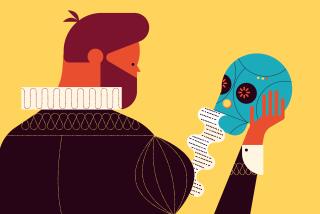Binary Notations : A Deejay Encounters Computers, and Falls in Love
- Share via
“Puterman.” Pew-ter-man. The word sounds like it might be the title of an outer-space special, coined by a TV scriptwriter. In fact, Puterman came into existence in a plebeian manner.
I wanted to write about the childlike thrill I’ve felt at becoming part of the computer generation, even though I’m far from childhood, having hit the double nickel--55--a few months ago. It wouldn’t have been unreasonable to expect that I’d go to the grave having never booted up anything other than my big, flat feet.
How did I come to find myself mixed up with chips, software and a monochrome monitor? Well, I’ve been in broadcasting for 34 years, primarily as a disc jockey. I’ve witnessed the change in radio’s style and format since the early ‘50s. Back then, we had platter patter mixed in with turntable twisting. Everything was live; the personality was paramount.
Today we refer to the radio station as being “automation-assisted.” The “busy work” is performed by a Harris 9000, which not only stores all the elements of the broadcast day in its memory but also tells me when I may speak on the air. If I’m not ready when Harris calls, the “silent sense” portion of its program notes my tardiness and “steps” to the next event--and rings an alarm for everyone in the studio to hear.
To be candid, I didn’t much like Harris at first. But I’ve had to recognize that he’s--it’s--not going to go away. He can do more for the station, in less time, than I can. He seldom comes down with the flu, and he works overtime for very little extra compensation.
Even his twinkling LEDs are prettier than my haunting, hazel eyes; his paint job has nary a blemish. It would take an extremely shortsighted person not to reckon with such an adversary--though I’d tried, for a while, with Harris’ predecessor. That was back when we used an IBM reader for a controlling brain and we could load the cards wrong and watch it cough and spit up.
Then the punched tape came into our lives, and suddenly, as we used a more dependable demon, the automation room became a hub of importance. I was told that electromagnetic coils were doing the memory work. No cards had to be fed into the hopper. In other words, man and machine were drifting even farther apart. We had become more dependent on this bit of technology than it was on us.
Only a fool would miss this handwriting on the wall, especially now that it was binary.
And then Harris showed up, and even the punched tape went by the wayside. Now, everything was performed by using a disk filled with the pertinent information that would keep our facility running smoothly. The die was cast. And so one day, Harris and I had a talk.
“If you’re taking over here,” I said, “I’ll try to get in tune with your unusual ways.”
Harris blinked a bit and seemed to nod with appreciation that some live creature could finally give up his heretofore-protected territory. It wasn’t easy giving in to a non-human, but I had to agree that he was doing his part, without too many glitches.
That was when I became friends with Harris. I paid attention to the engineer’s instructions concerning his care and feeding. I learned how to enter new data, and how to switch to the “manual mode” if that was called for. Harris started taking on a personality that was really not too far removed from my own. I have found that I can count on him to do the things he said he would do. He very seldom becomes self-centered. He has promoted the trust of a trusted friend.
Now, when I sign on for my shift, I stop by and give Harris a little pat, letting him know our relationship is no longer filled with animosity.
With all that in mind, it’s no great surprise that I was receptive to an offer tendered by our corporate bosses: an opportunity to purchase an IBM-PC on an installment plan.
I was concerned about having a computer in our apartment. Where would Kay, my wife, and I put it? Suppose it blew up? What if it was more contentious than its big brother? “But it must be fate,” I reasoned. “A computer is coming to me. I didn’t go looking for it.”
After signing the necessary papers to get in on the deal, I started getting excited. Excitement turned into anxious waiting. I wanted to meet this new entity.
I talked with the station’s chief engineer. He put my mind at ease, saying that the PC would be as easy to get along with as Harris. “Maybe easier,” he said. “After all, it’s just a simple-minded but powerful tool, designed to do what you want it to.”
It seemed a long time before the boxes finally arrived. When they did, I found that the keyboard and PC cartons would fit into the trunk of the car, while the monitor and printer sat comfortably in the back seat. I lugged the cartons up the 63 steps to the apartment and opened each one carefully, checking each piece of equipment against the packing list. A table was dusted off and made ready for its new occupant. The instruction manuals were given shelf space of their own.
After making the necessary connections between units, I plugged it in and turned it on.
The first sound I heard was a distinctive “beep.” The book had said to expect that; it was a test signal telling us humans that the circuits were healthy. An introduction disk was slipped into the “A” drive, and, adrenaline pumping, I made my first few keystrokes. Soon the initial rush subsided, and I was engrossed in the words on the screen.
For the next few weeks, we put ourselves and the new acquaintance through our respective paces. A young friend familiar with computers gave us some pointers on how to relate to the PC, saving us hours of poring over those involved manuals.
We played games with our PC--our Pussycat, as we came to call it. We’d take turns, each waiting impatiently for the other to finish. Even our three real-live kittens would perch on the bed or a chair watching us. Then, after a month or so, we were introduced to WordStar, and we entered a strange new phase. This powerful word-processing software has an irresistible lure, especially to one with an urge to write. Sure, I’ve written: personal and business letters; commercials for radio (using a typewriter); rewrites of news stories. But this was different, something more. WordStar made it so much simpler to compose my ideas.
I decided that a writer is nothing more than someone who has something to say but who does it on paper--rather than, for example, on the radio. “I can do that,” I thought.
Staring into this monitor of green and black has become a passion. Every day, I itch for the switch to be thrown, to hear the subsequent reactive beep announcing that the Pussycat, WordStar and I are about to embark on another session of putting down observations, thoughts and ideas for the Epson RX-80 to print. I’m in love with this machine that has helped the words within me take shape and form.
So, where did “Puterman” come from? It’s simply my file name for this article. I had wanted to call the file COMPUTERMANIA, but the Pussycat and WordStar only accept up to eight characters for a file name.
It became PUTERMAN. I know now what I’ve become.






